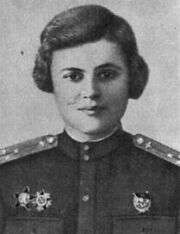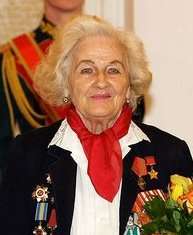Night Witches
| 588th Night Bomber Regiment | |
|---|---|
|
A Polikarpov Po-2, similar to the aircraft operated by the Night Witches | |
| Active | 1942–1945 |
| Country | Soviet Union |
| Branch | Soviet Air Forces |
| Role | Tactical bombing |
| Nickname(s) | Night Witches |
| Engagements | Eastern Front (World War II) |
| Commanders | |
| Regimental Commander | Yevdokia Bershanskaya |
| Aircraft flown | |
| Bomber | Polikarpov Po-2 |
"Night Witches" is the English translation of Nachthexen, a World War II German nickname (Russian Ночные ведьмы, Nochnye Vedmy) for the women military aviators of the 588th Night Bomber Regiment, known later as the 46th "Taman" Guards Night Bomber Aviation Regiment, of the Soviet Air Forces. Though women were initially barred from combat, Soviet Premier Joseph Stalin issued an order on October 8, 1941 to deploy three women's air force units, including the 588th regiment.[1] The regiment, formed by Colonel Marina Raskova and led by Major Yevdokia Bershanskaya, was made up entirely of women volunteers in their late teens and early twenties.
The regiment flew harassment bombing and precision bombing missions against the German military from 1942 until the end of the war.[2] At its largest, it had 40 two-person crews. The regiment flew over 24,000 missions and dropped 23,000 tons of bombs.[3] It was the most highly decorated all-women unit in the Soviet Air Force, each pilot having flown over 800 missions by the end of the war and twenty-three having been awarded the Hero of the Soviet Union title. Thirty of its members died in combat.[4]
The regiment flew in wood-and-canvas Polikarpov Po-2 biplanes, a 1928 design intended for use as training aircraft and for crop dusting, and to this day the most-produced biplane in aviation history. The planes could carry only six bombs at a time, so 8 or more missions per night were often necessary.[5] Although the aircraft were obsolete and slow, the pilots made daring use of their exceptional maneuverability; they had the advantage of having a maximum speed that was lower than the stall speed of both the Messerschmitt Bf 109 and the Focke-Wulf Fw 190, and as a result, German pilots found them very difficult to shoot down. An attack technique of the night bombers was to idle the engine near the target and glide to the bomb release point, with only wind noise left to reveal their location. German soldiers likened the sound to broomsticks and named the pilots "Night Witches."[1] Due to the weight of the bombs and the low altitude of flight, the pilots carried no parachutes.[6]
From June 1942, the 588th Night Bomber Regiment was within the 4th Air Army. In February 1943, the regiment was honored with a reorganization into the 46th Guards Night Bomber Aviation Regiment and in October 1943 it became the 46th "Taman" Guards Night Bomber Aviation Regiment.[7] "Taman" referred to the unit's involvement in two celebrated Soviet victories on the Taman Peninsula during 1943.
People


- Commanders
- Yevdokia Bershanskaya — Regimental Commander
- Yevgeniya Zhigulenko, Hero of the Soviet Union — Flight Commander
- Tat'yana Makarova, Hero of the Soviet Union — Flight Commander
- Nina Ul'yanenko, Hero of the Soviet Union — Flight Navigator
- Notable members
- Raisa Aronova
- Vera Bjelik
- Rufina Gasheva
- Polina Gelman
- Natalya Meklin
- Nadezhda Popova
- Yevgeniya Rudneva
- Irina Sebrova
Exclusively female units
On October 8, 1941, Order number 0099 specified the creation of three women's squadrons—all personnel from technicians to pilots would be entirely composed by women. These were:[8]
- 586 Regiment, Yak-1 fighters
- 587 Regiment, twin engine dive bombers
- 588 Regiment, night bombers
Although all three regiments had been planned to have women exclusively, only the 588th would remain an all-women regiment throughout the war. The 586th Regiment had to employ male mechanics as no women had received training to work on the Yakovlev fighter planes before the war. The 586th's woman commander, Major Tamara Aleksandrovna Kazarinova, was replaced by a man, Major Aleksandr Vasilievich Gridnev, in October 1942. The 587th Regiment was originally under the command of Marina Raskova, but after her death in 1942, a male commanding officer, Major Valentin Vasilievich Markov, replaced her. The 587th's PE-2 dive bombers also required a tall person to operate the top rear machine gun, but not enough women recruited were tall enough, requiring some men to join the aircrews as radio operator/tail gunner.[4][9]
Film and television depictions
In 1981, a Soviet feature-length film called Night Witches In The Sky (В небе ночные ведьмы) was directed by Evgenia Zhigulenko (Евгения Жигуленко), Hero of the Soviet Union, and one of the members of the 588th.[10]
In 2001, a UK-Russian co-production starring Malcolm McDowell, Sophie Marceau and Anna Friel was due to be made, but failed to get backing from an American studio.[11]
In 2013, a short animation called The Night Witch commemorating Nadezhda Popova, who had died earlier that year, was commissioned in collaboration with The New York Times Magazine's The Lives They Lived issue and directed by Alison Klayman.[12]
There was a film project underway in 2013, to be written by Gregory Allen Howard and financed by the grandson of Boris Yeltsin.[13]
In 2013, a Russian TV series titled Night Swallows was produced and distributed.[14]
Cultural references
- The Night Witches had appeared in the long-running British comic strip Johnny Red. Writer Garth Ennis, a childhood fan of the strip, would later write a three-part comic book mini-series called Battlefields: The Night Witches.[15]
- Another comic where the Night Witches appeared is "The Grand Duke" by Yann and Romain Hugault (Archaia Entertainment, 2012.)[16]
- Swedish power metal band Sabaton's 2014 album, "Heroes", had a track named "Night Witches" about the 588th Night Bomber regiment.
- Jason Morningstar's Night Witches is a tabletop Role-playing game (Bully Pulpit Games, 2015).[17]
- The fictional character of Ludmila Gorbanova from Harry Turtledove's Worldwar series is one of the Night Witches. After the invasion of the Race, she flies sorties against them.
- Death metal band Hail of Bullets recorded a song Nachthexen.
- Russian metal band Aella released an album with the eponymous track "Ночные ведьмы" ("Night Witches").[18]
- The Night Witches were featured in David L. Robbins' novel, Last Citadel.
- In the comic DC Comics Bombshells, the characters Supergirl and Stargirl are both pilots in the Night Witches (anachronistically in a 1940 where the USSR is already at war with Germany).
See also
- Washing Machine Charlie, term for Japanese night harassment aircraft during WW II's Guadalcanal Campaign and later.
- Charles Carpenter, a US Army officer who successfully improvised the use of anti-tank ordnance from an American L-4 Grasshopper artillery observation aircraft.
References
- 1 2 "Nadezhda Popova, WWII 'Night Witch' dies at 91". The New York Times. July 14, 2013. (subscription required (help)).
- ↑ "Rakobolskaya, Irina V.; Kravtsova, Natalya F. (2005). Нас называли ночными ведьмами [We were called the Night Witches] (in Russian). Moscow: Moscow State University. ISBN 5-211-05008-8.
- ↑ "Nadezhda Vasilyevna Popova". Encyclopædia Britannica Online. Encyclopædia Britannica Inc. April 28, 2016.
- 1 2 Noggle, Anne; White, Christine (2001). A Dance with Death: Soviet Airwomen in World War II. College Station, Texas: Texas A&M University Press. pp. 20–21. ISBN 1-58544-177-5.
- ↑ Garber, Megan (July 15, 2013). "Night Witches: The Female Fighter Pilots of World War II". The Atlantic. Retrieved June 29, 2016.
- ↑ Axell, Albert (2002). Russia's Heroes 1941–45. New York: Carroll & Graf Publishers. pp. 60–62. ISBN 0-7867-1011-X.
- ↑ Erokhin, Evgeny (2008). "65-летие 4-ой Армии ВВС и ПВО − Ростов-на-Дону, 25−26 мая 2007" [The 65th anniversary of the 4th Red Army Air Force and Air Defence Forces − Rostov-on-Don, 25−26 May 2007]. missiles.ru (in Russian). Retrieved June 29, 2016.
- ↑ Kharin, V. V. (2016). "Приказ НКО СССР 0099 от 08.10.41 – О сформировании женских авиационных полков ВВС Красной Армии" [Prikaz NKO SSSR 0099 of 10/08/41 – On the formation of women's aviation regiments of the Red Army Air Force]. allaces.ru (in Russian). Retrieved June 29, 2016.
- ↑ Bhuvasorakul, Jessica Leigh (March 25, 2004). "Unit Cohesion Among the Three Soviet Women's Air Regiments During World War II" (PDF). Tallahassee, Florida: Florida State University. Archived from the original (PDF) on February 25, 2012. Retrieved June 29, 2016.
- ↑ "V nebe 'Nochnye vedmy' (1981)". IMDb. 2016. Retrieved June 29, 2016.
- ↑ Birchenough, Tom (June 28, 2001). "'Witches' hitches U.K.-Russian team". Variety. Retrieved June 29, 2016.
- ↑ "The Night Witch". The New York Times. December 12, 2001. (subscription required (help)).
- ↑ Kroll, Justin (November 4, 2013). "'Remember the Titans' Scribe to Pen World War II Drama 'Night Witches'". Variety. Retrieved June 29, 2016.
- ↑ "Night Swallows". YouTube. Retrieved 29 June 2016.
- ↑ "Garth Ennis's Battlefields: Night Witches". Dynamite Entertainment. Archived from the original on February 6, 2009. Retrieved June 29, 2016.
- ↑ Burgas, Greg (August 9, 2013). "Review time! with The Grand Duke". Comics Should Be Good @ CBR. Retrieved June 29, 2016.
- ↑ Morningstar, Jason (2015). "Night Witches". Bully Pulpit Games. ISBN 978-0-9883909-2-8. Retrieved June 29, 2016.
- ↑ "Aella". Encyclopaedia Metallum: The Metal Archives. 2016. Retrieved June 29, 2016.
Bibliography
- Cottam, Kazimiera Janina (1998). Women in War and Resistance: Selected Biographies of Soviet Women Soldiers. Newburyport, MA: Focus Publishing/R. Pullins Co. ISBN 1-58510-160-5.
- Cruz, Alberto (2013). Las brujas de la noche. El 46 Regimiento Taman de aviadoras soviéticas en la II Guerra Mundial (in Spanish). La Caída. ISBN 9788461662296.
- Milanetti, Gian Piero (2013). Soviet Airwomen of the Great Patriotic War: A pictorial history. Istituto Bibliografico Napoleone, Rome, Italy. ISBN 9788875651466.
- Milanetti, Gian Piero (2011). Le Streghe della Notte: La storia non detta delle eroiche ragazze-pilota dell'Unione Sovietica nella Grande Guerra Patriottica (in Italian). Istituto Bibliografico Napoleone, Roma, Italia. ISBN 88-7565-100-0.
- Pennington, Reina (1997). Wings, Women, and War: Soviet Airwomen in World War II Combat. University Press of Kansas. ISBN 0-7006-1554-7.
- Sakaida, Henry (2003). Heroines of the Soviet Union: 1941–45. Osprey Publishing. ISBN 978-1-84176-598-3.
Further reading
- Dixon, Robyn (May 10, 2001). "Day of Glory for USSR's Night Witches". Los Angeles Times. Retrieved June 29, 2016.
- Wright, Mike (1998). What they didn't teach you about World War II. Novato, California: Presido. ISBN 978-0-89141-649-4.
External links
- Duncan, Phyllis-Anne (2014). "Russian Women Pilots". avstop.com. Retrieved June 29, 2016.
- "The Night Witches - Russian Combat Pilots of World War Two". h2g2. June 21, 2015. Retrieved June 29, 2016.
- Iken, Katja (November 16, 2009). "Stalins Himmelstürmerinnen" [Stalin's sky stormers]. Spiegel Online (in German). Hamburg: SpiegelNet GmbH. Retrieved June 29, 2016.
- Dowdy, Linda (2008). "The Night Witches: The True Story of an Incredible Group of Women". Seize the Sky. Retrieved June 29, 2016.
